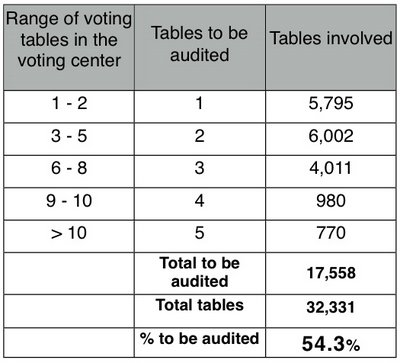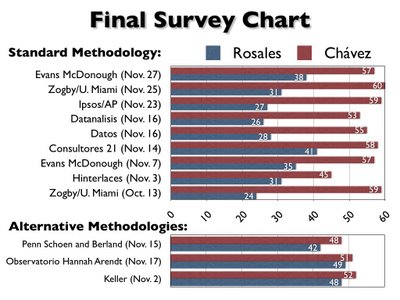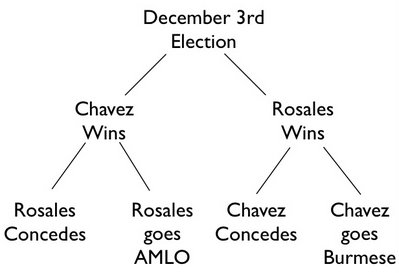 Katy says:
Katy says: Last night,
Globovisión held a town-hall meeting with opposition candidate Manuel Rosales. It was an interesting broadcast since it allowed the candidate to get all sorts of questions from an audience that was clearly comprised of chavistas and opposition folk alike. It really should have been a debate, but Pres. Chávez refuses to debate the issues, as has been customary during his entire political career. Here are translated excerpts of what transpired:
First segmentQuestion 1: What happens to Mi Negra when the price of oil falls?
A: We should be positive. What is being given away to foreign countries is going to Mi Negra. 1 million Bs. would be the Mi Negra handout under the current conditions of the price of oil, Mi Negra would go down to 600 thousand if the price of oil were to fall. Nevertheless, I think the price of oil is going to remain high for quite some time.
Question 2: Why did you sign the Carmona decree?
A: This was confusing to all. The President resigned, I acted in good faith. I was not even in Caracas. I am a democrat by conviction, I have proven that by winning and losing many elections.
Question 3: What is your proposal regarding personal safety?
A: As President, this will be a priority for me and I will be held responsible, I will not ellude my responsability like the current President does, blaming his subordinates. We have to put personal safety and the protection of life as a top priority. We must re-engineer our police forces, make them professional and weed out the rotten cops. We also need 150 thousand more police officers. We will work with universities and other institutions to help form them. We will also form a National Police Corps to coordinate the fight against organized crime.
Question 4: Why do you say you will keep the Missions when you said people in Misiones were "parasites"?
A: I did not say that, I respect people and my comments were taken out of context by my opponents. Misiones are not new, they used to exist under different names: Mercal used to be Proal. Misión Robinson used to be Acude. The problem is that now they are used as tools to blackmail people. In my government, social programs will be for everyone. But also, the Venezuelan people want jobs, they want stability, they don’t want any more “
burusas”, social programs should help the poorest Venezuelans but we need to create stable jobs. The other candidate, the candidate of the “
trocha mocha” says that poverty is good, that it’s all good if you believe in Socialism. I don’t believe in that. People deserve a better life, they deserve the tools to take off and improve their lives.
Second segmentQuestion 5: What are you going to do about the jails in Venezuela?
A: There is no justice in Venezuela, and we have no jails, they are simply places where we store people. There are prisoners who have not been sentenced for years. I know of people who have been in prison for years and later are told they are innocent. I believe in the descentralization of the jail system, and I believe jails should provide training and reinsertion into society.
Question 6: What are your proposals toward the children on the streets and those that are on drugs.
A: The problem lies in the deterioration of the family. There has not been any serious attempt in Venezuela to help street children. It’s awful to see how the number of boys and girls on the street keeps growing. This is a serious issue that requires serious solutions. But the key is education, quality of life, and putting citizens before the needs of the State.
Question 7: What do you think of the fear that public employees feel with the fingerprint scanning machines being used to determine how they voted?
A: I respect public workers, and I want to give them decent salaries, both current workers and those that are retired. Our retired public employees only receive crumbs. I want to give retired public workers their
Cestaticket benefits. The fingerprint machines are no good, they don’t work. They simply have to justify the money they spent on them by using them. They do not discover your vote, people can vote with their heart and their conscience knowing that nobody will ever know who they voted for. They should vote for the future, for the future of our children.
Third segment Question 8: What guarantees do we have that mi Negra is not simply electoral “
paja”?
A: We’ve been getting “
paja” for a century. With Mi Negra we are going to give the Venezuelan people the money that is being given away. We want to give people the funds so that they can open their own businesses. We’ve done that in Zulia at a very small scale. Venezuelans own their wealth, and nobody gave the government permission to give that money away. It’s about social justice.
Question 9: I want to look you in the eyes. I voted for Chavez, for a change. He has changed Venezuela, taking it to a quasi-communism. How will we “charge” the votes? How do we know that when you win, you won’t feel like a “king” and that you will keep your promises?
A: I understand that many good-hearted Venezuelans voted for Chavez, for a change. I hope that people who believe they were lied to, come to us. I will govern from the street, and as President I will not lock myself up in Miraflores in air conditioning, nor will I simply travel around the world enjoying the perks of the job.
Question 10: You have not spoken clearly about what to do about corruption. What do you propose to do about that?
A: Corruption is a consequence of the example the leaders set to the people. If leaders don’t believe in justice, nothing works. The government rewards the corrupt, and shuns those that are honest. It’s pure “
viveza criolla”. The message people are getting is that you have to be a “
vivo”. That’s why I propose that decency will be a priority for the government from day one.
Question 11: Is the Electoral Registry OK? Will my vote count?
A: The Registry is very much improved. It is good enough for us to participate, as long as we guard the process. I have told this to the CNE many times: we will not accept a change in the rules the day of the elections, nor a change in the laws, nor any non-compliance of the law. If the audit is not done randomly, we will not accept that. If it is done before the vote count, we will not accept that. We will not accept any changes in electoral conditions.
Question 12: Why don’t you ever laugh? (public laughs, Rosales laughs)
A: Oh, I laugh. (
applause for breaking the ice, says the moderator) I laugh. Candidates are told “you have to laugh this way, you have to stand this way,” and they end up disguising the candidate. When I have to talk about crime, about children in the street, about hunger, about poverty, about the possibility of having elections stolen, I can’t laugh when I discuss these things, these are serious topics. But if you ask me that, then I have to laugh.
Question 13: What would you do or say if President Chavez walked into this studio right now?
A: I would greet him, welcome him (
applause), ask him to sit down and take questions. It is a right of the Venezuelan people to ask him about the results of his eight years in the government. The people need to know what he plans to do to mend his ways and mend this disaster.
Question 14: I don’t care about "red, very red", I care about education and health care. What are your guarantees about that?
A: I guarantee we will give you the tools. We have recently graduated, thanks to Zulia governorship scholarships, thousands of electricians. After a century of oil exploitation, we are not doing well. Why do our kids have to think about leaving the country? How can we exploit tourism if there are few sewers, if we pollute our beaches with sewer water?
Fourth segmentQuestion 15: This government has failed in terms of health care. What would you do about that?
A: The Zulia health care system is completely different. We rely on small enterprises and cooperatives. We have hospitals there with first-class technology. We have to increase funding for our hospitals. Anyone who says that health care is going to be free but does not provide the resources for that is lying. But we also have to improve our small scale neighborhood health care facilities. Cuban doctors help, but people with problems generally have to go to hospitals, and hospitals are not working.
Question 16: What do you think of the barter system that Chavez is proposing?
A: That it is backwards, we’re discussing very primitive activities here. That is how mankind began. I’m here to talk about good wages, justice, education, health care, progress. The other candidate is saying that your salary is going to be paid with coupons, goods, chickens and things like that. It really shows contempt for the intelligence of the Venezuelan voter, and it’s why people are turned off by politicians. So I hope some day you don’t pay me with a chicken and I have to pay you back with a sack of plaintains. (
laughs)
Question 17:
Moderator asks question: What do you say to Venezuelans who are tired of politics, those that don’t like the Fourth or the Fifth, the ni-nis?
A: That I respect them. That they are right in many ways. It’s been too many lies, too many frustrations, we’ve gone from failure to failure. But I would tell them the choice is not between candidates, but it’s the future of Venezuela itself. They have to choose between backwardness or modernity, between the future and the past for our children. It’s a proposal to get out of the dumps, so that Venezuela can be a great, beautiful country that rises from the problems it is mired in.
Moderator thanks the crowd. Applause. Candidate's final comment: My greetings, with affection, with love, to all Venezuelans. No matter who you are going to vote for, I ask you to participate in the reconciliation of our country, so that we can build a more just, modern country, where we can redistribute our oil wealth, a country where we can all handle our differences. I want a great, modern Venezuela, where the future of our children, of our young people, who are the great reserve our country has, can be assured.
 Katy and Quico says:
Katy and Quico says: Greater Caracas Mayor kicked things off with one of the crazier attempts to suck up to Chávez we'd seen all year.
Greater Caracas Mayor kicked things off with one of the crazier attempts to suck up to Chávez we'd seen all year. elp cover the fine.
elp cover the fine.


























